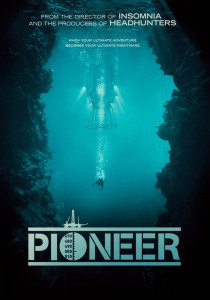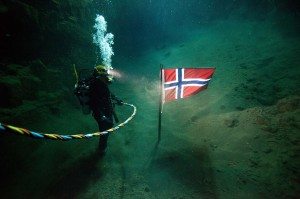
Any resemblance to posters for The Abyss is purely coincidental.
Pioneer is like The Parallax View except all wet. To be fair, it’s got good reasons for being drippy: much of it takes place under 500 meters of North Sea slosh.
Set in the early ’80s, this Norwegian film works under high pressure. It uses that weight to compress historical fact and ’70s-style thrillers into pulp. The end result resembles wet paper — quick to conform, impossible to read, and kind of fun to spitball if you’ve got time to kill.
Pioneer, for a premise, takes the construction of an oil pipeline during Norway’s oil boom. Reserves are discovered deep under the North Sea. To get the bounty ashore, new diving techniques must be developed, ones that allow divers to work at previously unsafe depths. The rewards of success will be enormous for Norway and for the American company that’s been savvy enough to land the partnership deal.
From its opening scrawl, Pioneer piles on the tension, building the scene with generous scoring (by Air) and claustrophobic camera work. While that may sound promising, it really just results in a lack of contrast. Most of Pioneer is played like the final act of a Mission Impossible film. This leaves an attentive viewer cued up to hunt for corporate malfeasance and betrayal with neither rest nor respite.
 Also, the film doesn’t make a ton of sense.
Also, the film doesn’t make a ton of sense.
Brothers Petter (Askel Hennie) and Knut (André Eriksen) are two of the few Norwegian divers being qualified for the lucrative diving job. They, and other divers including Mike (Wes Bentley), are crammed in a decompression chamber which is cranked up to 500 meters of pressure — that’s 50 times the pressure at sea level. Can they take it?
Mike is pulled out against his will. The brothers start hallucinating sea birds. Technicians and physicians squabble.
Director Erik Skjolbjærg leans hard into the fear and tension. Focus is frequently razor thin. Camera movement is unpredictable and off-kilter. The suffocation comes across. And so you know something is going to go wrong; it has to.
Too bad Pioneer skips establishing any good times with which we might contrast the bad to come. Petter is from the Night Moves mold. Knut… well Knut tells Petter that this will be his last dive. And then we meet Knut’s lovely wife and son and if you still can’t guess what will go wrong, you’re reading the wrong blog.
Like in classic conspiracy thrillers, Pioneer‘s five screenwriters shuffle up a range of possible antagonists arrayed along a maze of false leads. Unlike those classics, which potential villain ends up having done the deed and why remains a head scratcher. It’s not enough to keep your audience guessing; you have to also make them slap their heads at the end for not seeing the obvious.
Blame, perhaps the murky depths?
While the plot — not factual enough to justify its questionable convolutions — isn’t close to watertight, Skjolbjærg’s film doesn’t suck. Inventive and evocative direction elevates some scenes. While you may not understand who’s trying to kill whom and why, neither does Petter and that’s involving to a degree. Occasional use of special effects and time-warping editing also seemed imported from a better film. Performances are fine, if mostly subsumed by period dress and over-reliance on tone and color to convey the time period. We get it: it’s the ’80s.

Hold on. Darryl Revok will be here in one minute.
People die and people are killed in Pioneer. Money changes grubby hands. Petter acts the man in the wrong place at the wrong time and I’ll leave you to guess if he muddles through or not. Norway, as you likely know, got their oil and became one of the wealthiest countries in the world. Perhaps that’s justification for a few shenanigans?
As for poor Petter, Pioneer ends with me wondering what to make of him. Was he a pawn in a powerful game? Was he to blame — or to credit — for Norway’s path? I appreciate the film’s open ending but could have cared more.
For as wild-eyed and insistent as Petter was, he might have cared more as well. This sort of ending can come together for directors such as Alan J. Pakula but it’s no easy feat.
And if you try to bring too much to the surface too quickly, you just end up with the bends.

